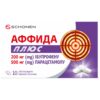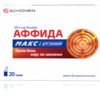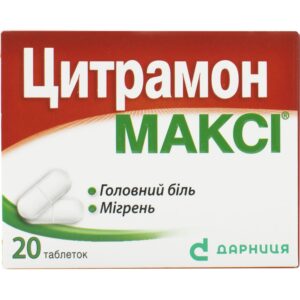No products in the cart.
We deliver to:
🇦🇺 Australia
🇨🇦 Canada
🇨🇿 Czechia
🇩🇰 Denmark🇪🇪 Estonia
🇮🇪 Ireland
🇮🇱 Israel
🇮🇹 Italy
🇯🇵 Japan
🇲🇽 Mexico
🇵🇱 Poland
🇰🇷 South Korea
🇨🇭 Switzerland
🇬🇧 United Kingdom
🇺🇸 United States of Americaand more
We deliver to:
🇦🇺 Australia
🇨🇦 Canada
🇨🇿 Czechia
🇩🇰 Denmark🇪🇪 Estonia
🇮🇪 Ireland
🇮🇱 Israel
🇮🇹 Italy
🇯🇵 Japan
🇲🇽 Mexico
🇵🇱 Poland
🇰🇷 South Korea
🇨🇭 Switzerland
🇬🇧 United Kingdom
🇺🇸 United States of Americaand more
[category_image]
Affida Max Express soft capsules 400 mg 20 pcs.
$23.09
Affida Max Express is a nonsteroidal anti-inflammatory and antirheumatic agent for the symptomatic treatment of mild to moderate pain of various origins (headache, toothache, painful menstruation), including colds and fever.
Categories: Pain relief
Brand: Schonen
Affida Max Express is a nonsteroidal anti-inflammatory and antirheumatic agent for the symptomatic treatment of mild to moderate pain of various origins (headache, toothache, painful menstruation), including colds and fever.
Warehouse
- 1 soft capsule contains 400 mg of ibuprofen;
- excipients: polyethylene glycol, potassium hydroxide, purified water;
- capsule composition: gelatin, sorbitol (E 420), purified water, soy lecithin, triglycerides.
Contraindication
Hypersensitivity to the active substance or to any of the components of the medicinal product.
Hypersensitivity reactions (e.g. bronchial asthma, rhinitis, angioedema or urticaria) previously observed after taking ibuprofen, acetylsalicylic acid or other NSAIDs.
Gastric ulcer/bleeding in active form or history of recurrence (two or more severe episodes of ulcer or bleeding).
History of gastrointestinal bleeding or perforation associated with NSAID use.
Severe hepatic impairment, severe renal impairment; heart failure (NYHA class IV).
The last trimester of pregnancy.
Method of application
For oral use in adults and children aged 12 years and over weighing >40 kg. For short-term use only. Undesirable effects can be minimised by using the lowest effective dose for the shortest period of time necessary to control symptoms.
Capsules should be taken preferably during or after meals, without chewing and with water.
The single dose for children aged 12 years and over with a body weight of >40 kg and adults is 1 capsule (400 mg ibuprofen). If necessary, 1 capsule can be used every 6 hours. The maximum daily dose is 1200 mg (3 capsules per day). Use the minimum effective dose necessary to treat symptoms for the shortest possible period of time.
Application features
Elderly patients have an increased incidence of adverse reactions to NSAIDs, especially gastrointestinal bleeding and perforation, which can be fatal.
Respiratory effects: Bronchospasm may occur in patients with or with a history of bronchial asthma or allergic diseases.
Pregnant women
NSAIDs should not be taken during the first two trimesters of pregnancy unless, in the opinion of the physician, the potential benefit to the patient outweighs the potential risk to the fetus. If ibuprofen is used by a woman attempting to conceive, or during the first and second trimesters of pregnancy, the lowest possible dose should be used for the shortest possible period of time.
Ibuprofen is contraindicated during the third trimester of pregnancy.
Children
Do not use in children under 12 years of age and weighing <40 kg.
Drivers
When used in accordance with the recommended doses and duration of treatment, the drug does not affect the reaction speed when driving or working with other mechanisms.
Overdose
Most patients who have taken clinically significant amounts of NSAIDs have experienced only nausea, vomiting, epigastric pain, and very rarely diarrhea. Tinnitus, headache, and gastrointestinal bleeding may also occur. In more severe poisoning, toxic CNS effects may occur, manifesting as vertigo, drowsiness, and sometimes agitation and disorientation or coma. Sometimes patients experience convulsions.
Side effects
Psychiatric disorders: psychotic reactions, depression.
Nervous system: headache, dizziness, insomnia, anxiety, irritability or fatigue.
On the part of the organs of vision: visual impairment.
From the organs of hearing and balance: tinnitus, hearing loss.
From the side of the cardiac system: palpitations, heart failure and myocardial infarction.
From the vascular system: arterial hypertension, vasculitis, edema.
Storage conditions
Store at a temperature not exceeding 30°C. Store in the original packaging. Keep out of the reach of children.
Be the first to review “Affida Max Express soft capsules 400 mg 20 pcs.” Cancel reply
You may also like










Reviews
There are no reviews yet.